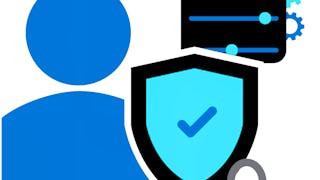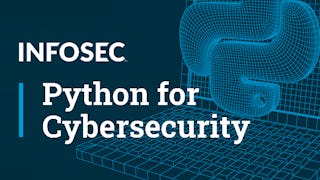Exploitation techniques
Most popular
 Status: Free TrialFree TrialN
Status: Free TrialFree TrialNNew York University
Course
 Status: Free TrialFree TrialM
Status: Free TrialFree TrialMMicrosoft
Course
 Status: Free TrialFree TrialU
Status: Free TrialFree TrialUUniversidad de los Andes
Specialization
 Status: PreviewPreview
Status: PreviewPreview
Trending now
 Status: Free TrialFree Trial
Status: Free TrialFree Trial Status: Free TrialFree Trial
Status: Free TrialFree TrialSpecialization
 Status: Free TrialFree TrialI
Status: Free TrialFree TrialIInfosec
Specialization
 Status: Free TrialFree Trial
Status: Free TrialFree Trial
New releases
 Status: Free TrialFree Trial
Status: Free TrialFree TrialCourse
 Status: Free TrialFree Trial
Status: Free TrialFree TrialCourse
 Status: PreviewPreviewS
Status: PreviewPreviewSStarweaver
Course
 Status: Free TrialFree Trial
Status: Free TrialFree TrialCourse
Filter by
SubjectRequired *
LanguageRequired *
The language used throughout the course, in both instruction and assessments.
Learning ProductRequired *
LevelRequired *
DurationRequired *
SubtitlesRequired *
EducatorRequired *
Results for "exploitation techniques"
 Status: NewNewStatus: Free TrialFree Trial
Status: NewNewStatus: Free TrialFree TrialSkills you'll gain: MITRE ATT&CK Framework, Penetration Testing, Incident Response, Cyber Threat Hunting, Cybersecurity, Cyber Threat Intelligence, DevSecOps, Cloud Security, Patch Management, Cyber Security Assessment, Exploitation techniques, Network Security, Computer Security Incident Management, Business Continuity, Cryptography, Responsible AI, Threat Modeling, Information Systems Security, DevOps, Disaster Recovery
Beginner · Specialization · 1 - 3 Months
 Status: NewNewStatus: Free TrialFree Trial
Status: NewNewStatus: Free TrialFree TrialSkills you'll gain: Penetration Testing, Cyber Security Assessment, Exploitation techniques, Vulnerability Scanning, Cybersecurity, Vulnerability Assessments, Network Security, Open Web Application Security Project (OWASP), SQL
Beginner · Course · 1 - 4 Weeks
 Status: NewNewStatus: Free TrialFree Trial
Status: NewNewStatus: Free TrialFree TrialSkills you'll gain: Penetration Testing, Cyber Security Assessment, Cybersecurity, Information Systems Security Assessment Framework (ISSAF), Cyber Security Strategy, Vulnerability Assessments, Cyber Threat Intelligence, Threat Modeling, Exploitation techniques, Cyber Security Policies, Computer Security, Security Controls, Data Security
Intermediate · Course · 1 - 4 Weeks
 Status: Free TrialFree Trial
Status: Free TrialFree TrialSkills you'll gain: Cyber Threat Hunting, Cyber Threat Intelligence, Threat Modeling, Penetration Testing, Threat Detection, MITRE ATT&CK Framework, Cryptography, Security Testing, Application Security, Encryption, Cybersecurity, Vulnerability Scanning, Open Web Application Security Project (OWASP), Vulnerability Assessments, Exploitation techniques, Test Planning
4.6·Rating, 4.6 out of 5 stars2.5K reviewsIntermediate · Course · 1 - 3 Months
 Status: NewNewStatus: PreviewPreviewS
Status: NewNewStatus: PreviewPreviewSStarweaver
Skills you'll gain: MITRE ATT&CK Framework, Cyber Operations, Threat Modeling, Cyber Security Strategy, Cyber Threat Intelligence, Penetration Testing, Cybersecurity, Exploitation techniques, Threat Detection, Vulnerability Assessments, Human Factors (Security), Security Awareness, Security Testing, Network Security, Generative AI
Intermediate · Course · 1 - 3 Months
 Status: NewNewStatus: Free TrialFree Trial
Status: NewNewStatus: Free TrialFree TrialSkills you'll gain: Vulnerability Assessments, Vulnerability Management, Malware Protection, Cyber Security Assessment, Threat Detection, Penetration Testing, Threat Management, Exploitation techniques, Infrastructure Security, Network Security, Information Systems Security
Intermediate · Course · 1 - 4 Weeks
What brings you to Coursera today?
 Status: Free TrialFree Trial
Status: Free TrialFree TrialSkills you'll gain: Penetration Testing, Exploitation techniques, Scripting, Scripting Languages, Python Programming, Cyber Operations, Object Oriented Programming (OOP), Network Security, Network Protocols, Debugging
4.8·Rating, 4.8 out of 5 stars12 reviewsAdvanced · Course · 1 - 3 Months
 Status: NewNewStatus: Free TrialFree Trial
Status: NewNewStatus: Free TrialFree TrialSkills you'll gain: Distributed Denial-Of-Service (DDoS) Attacks, Network Security, Intrusion Detection and Prevention, Cybersecurity, Cyber Security Strategy, Threat Detection, Vulnerability Assessments, Firewall, Exploitation techniques, Human Factors (Security), Network Analysis
Intermediate · Course · 1 - 4 Weeks
 Status: NewNewStatus: Free TrialFree Trial
Status: NewNewStatus: Free TrialFree TrialSkills you'll gain: Open Web Application Security Project (OWASP), Authentications, Web Applications, Penetration Testing, Application Security, Security Controls, Vulnerability Assessments, Application Programming Interface (API), Exploitation techniques, Web Servers, Cloud Security, SQL
Intermediate · Course · 1 - 4 Weeks
 Status: NewNewStatus: Free TrialFree TrialU
Status: NewNewStatus: Free TrialFree TrialUUniversity of Colorado Boulder
Skills you'll gain: Penetration Testing, Network Security, Exploitation techniques, Open Web Application Security Project (OWASP), Cyber Security Assessment, Unix, Computer Security, Network Monitoring, Application Security, Vulnerability Assessments, Cybersecurity, Artificial Intelligence and Machine Learning (AI/ML), Cryptographic Protocols, Network Protocols, Cryptography, Security Awareness, Generative AI Agents, Server Side, Web Applications, Machine Learning Algorithms
4.4·Rating, 4.4 out of 5 stars10 reviewsIntermediate · Specialization · 3 - 6 Months
 Status: Free TrialFree TrialJ
Status: Free TrialFree TrialJJohns Hopkins University
Skills you'll gain: Large Language Modeling, Email Security, Exploitation techniques, Border Gateway Protocol, Malware Protection, Mobile Security, Cybersecurity, Network Security, Open Web Application Security Project (OWASP), Network Monitoring, TCP/IP, Threat Detection, Network Analysis, Internet Of Things, Network Protocols, Responsible AI, Network Routing, Infrastructure Security, Application Security, Information Systems Security
3.9·Rating, 3.9 out of 5 stars7 reviewsIntermediate · Specialization · 3 - 6 Months
 Status: Free TrialFree Trial
Status: Free TrialFree TrialSkills you'll gain: MITRE ATT&CK Framework, Vulnerability Assessments, Open Web Application Security Project (OWASP), Distributed Denial-Of-Service (DDoS) Attacks, Vulnerability Scanning, Vulnerability Management, Threat Modeling, Cybersecurity, Malware Protection, Mobile Security, Cyber Threat Intelligence, Penetration Testing, Exploitation techniques, Network Security, Cryptography, Exploit development, Information Systems Security, Threat Detection, Intrusion Detection and Prevention, Cloud Security
4.7·Rating, 4.7 out of 5 stars22 reviewsBeginner · Specialization · 3 - 6 Months







